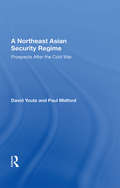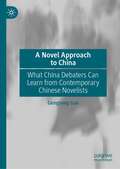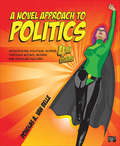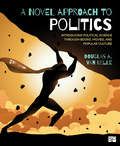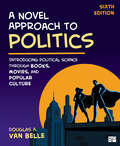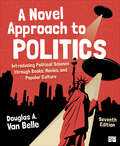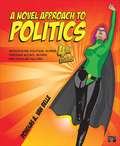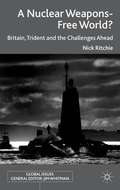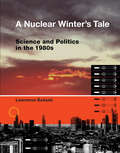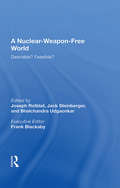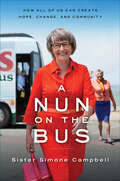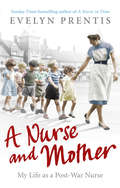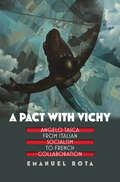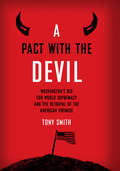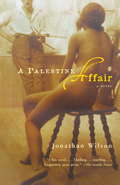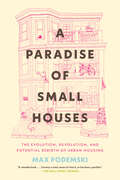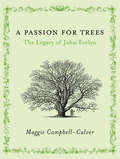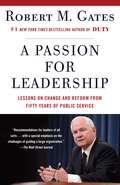- Table View
- List View
A Northeast Asian Security Regime: Prospects After The Cold War
by David YoutzFor more than two decades, the USSR promoted the idea of multilateral security cooperation in Asia. Under Mikhail Gorbachev, this was referred to as "a Helsinki process for Asia" or a "Conference on Security and Cooperation in Asia" (CSCA) to parallel Europe's CSCE. Until the end of the 1980s, such an idea was frozen along the lines of the Cold War. East Asian governments dismissed the idea of a CSCA as Cold War propaganda or, at best, an untransferable European concept ill-suited to East Asia.
A Novel Approach to China: What China Debaters Can Learn from Contemporary Chinese Novelists
by Gengsong GaoThis book explores Chinese novelists’ distinctive contributions to the China debate in terms of the key issues of Chinese language, power dynamics and Confucian tradition. As China is rising, Chinese scholars and policymakers are debating heatedly over China’s past, present and future. Who are the major debaters? How do they analyze China’s problems and figure out solutions? What are the main achievements and weaknesses of the Chinese intellectual debate and discourse? Chinese novelists also get involved in the China debate. However, their voices are rarely heard. This book argues that, by dramatizing the diversities of ordinary social actors’ everyday languages, active discursive practices and enchanted local traditions, Chinese novelists do not merely illustrate the dominant liberal, the New Left and the New Confucian ideologies, but enrich the China debate and provide a “novel” approach to our understanding of modern China.
A Novel Approach to Politics: Introducing Political Science through Books, Movies, and Popular Culture
by Douglas A. Van BelleA Novel Approach to Politics isn’t like other textbooks. This is one that students want to read. With his new Fourth Edition, Douglas A. Van Belle continues to turn conventional wisdom on its head by using pop culture references—updated in every chapter—to illustrate key concepts and to cover recent political events. Students will appreciate the tie between George R.R. Martin’s Game of Thrones and the authoritarian executive as much as House of Cards and cross-cutting cleavages, not to mention World War Z and bureaucracy. Just so things don't get too crazy, student aids are still in there—this time with new learning objectives joining chapter summaries, bolded key terms, and discussion questions. The “Thinkers in Boxes" call out pivotal political philosophers, theorists, and assorted hipsters, while the “Gods of Geekdom” highlight how the work of notable figures in science and science fiction tie into key chapter concepts.
A Novel Approach to Politics: Introducing Political Science through Books, Movies, and Popular Culture
by Douglas A. Van BelleA Novel Approach to Politics turns conventional textbook wisdom on its head by using pop culture references to illustrate key concepts and cover recent political events. This is a textbook you will want to read. Adopters of previous editions from schools all over the country are thanking author Douglas A. Van Belle for some of their best student evaluations to date. With this Fifth Edition, Douglas A. Van Belle brings the book fully up to date with recent events such as Trump’s executive orders on immigration, the 2016 elections in the US, current policy debates including recent court decisions that may affect gerrymandering, international happenings such as Brexit, and other assorted intergalactic matters. Van Belle adds a wealth of new and recent movies and books to the text, as he illustrates key concepts in political science through examples that captivate you. Employing a wide range of references from 1984 to Game of Thrones to House of Cards, students are given a solid foundation in institutions, ideology, and economics. To keep things grounded, the textbook nuts and bolts are still there to aid students, including chapter objectives, chapter summaries, bolded key terms, and discussion questions.
A Novel Approach to Politics: Introducing Political Science through Books, Movies, and Popular Culture
by Douglas A. Van BelleA Novel Approach to Politics turns conventional textbook wisdom on its head by using pop culture references to illustrate key concepts and cover recent political events. This is a textbook you will want to read. Adopters of previous editions from schools all over the country are thanking author Douglas A. Van Belle for some of their best student evaluations to date. With this Fifth Edition, Douglas A. Van Belle brings the book fully up to date with recent events such as Trump’s executive orders on immigration, the 2016 elections in the US, current policy debates including recent court decisions that may affect gerrymandering, international happenings such as Brexit, and other assorted intergalactic matters. Van Belle adds a wealth of new and recent movies and books to the text, as he illustrates key concepts in political science through examples that captivate you. Employing a wide range of references from 1984 to Game of Thrones to House of Cards, students are given a solid foundation in institutions, ideology, and economics. To keep things grounded, the textbook nuts and bolts are still there to aid students, including chapter objectives, chapter summaries, bolded key terms, and discussion questions.
A Novel Approach to Politics: Introducing Political Science through Books, Movies, and Popular Culture
by Douglas A. Van BelleA textbook you will want to read. A Novel Approach to Politics turns the conventional textbook wisdom on its head by using pop culture references to illustrate key concepts and cover recent political events. Adopters of previous editions are thanking author Douglas A. Van Belle for some of their best student evaluations to date. With this Sixth Edition, Van Belle brings the book fully up-to-date with current events and policy debates, international happenings, and other assorted &‘intergalactic&’ matters. Van Belle tackles the most tumultuous political periods in recent history head-on, encouraging you to engage with ideas, arguments, and information that might make you uncomfortable. Employing a wide range of references from Brooklyn Nine-Nine to The Good Place to Ready Player One, you are given a solid grounding in institutions, ideology, and economics. To keep things grounded, the textbook nuts and bolts are still there to aid you, including chapter objectives, chapter summaries, bolded key terms, and discussion questions.
A Novel Approach to Politics: Introducing Political Science through Books, Movies, and Popular Culture
by Douglas A. Van BelleA textbook you will want to read. A Novel Approach to Politics turns the conventional textbook wisdom on its head by using pop culture references to illustrate key concepts and cover recent political events. Adopters of previous editions are thanking author Douglas A. Van Belle for some of their best student evaluations to date. With this Sixth Edition, Van Belle brings the book fully up-to-date with current events and policy debates, international happenings, and other assorted &‘intergalactic&’ matters. Van Belle tackles the most tumultuous political periods in recent history head-on, encouraging you to engage with ideas, arguments, and information that might make you uncomfortable. Employing a wide range of references from Brooklyn Nine-Nine to The Good Place to Ready Player One, you are given a solid grounding in institutions, ideology, and economics. To keep things grounded, the textbook nuts and bolts are still there to aid you, including chapter objectives, chapter summaries, bolded key terms, and discussion questions.
A Novel Approach to Politics: Introducing Political Science through Books, Movies, and Popular Culture
by Douglas A. Van BelleA textbook your students will want to read. "If you would like students to understand hard political concepts, this work makes it accessible for them. By using pop culture, we can open ideological ideas and students are not bound by their own preconceived ideas." —Leah Murray, Weber State University A Novel Approach to Politics turns the conventional textbook wisdom on its head by using pop culture references to illustrate key concepts and cover recent political events. Adopters of previous editions are thanking author Douglas A. Van Belle for some of their best student evaluations to date. With this Seventh Edition, Van Belle brings the book fully up-to-date with recent events, current policy debates, international happenings, and other assorted political matters. Understanding politics requires a willingness to engage with ideas, arguments, and information that makes you uncomfortable, Van Belle takes the most tumultuous political periods in recent history head-on. Somehow, he weaves in recent movies and books into the text as he works in a solid foundation in institutions, ideology, and economics controversies into all that sizzle, which is certain to captivate students. Included with this title: LMS Cartridge: Import this title′s instructor resources into your school’s learning management system (LMS) and save time. Don′t use an LMS? You can still access all of the same online resources for this title via the password-protected Instructor Resource Site. Select the Resources tab on this page to learn more.
A Novel Approach to Politics: Introducing Political Science through Books, Movies, and Popular Culture
by Douglas A. Van BelleA textbook your students will want to read. "If you would like students to understand hard political concepts, this work makes it accessible for them. By using pop culture, we can open ideological ideas and students are not bound by their own preconceived ideas." —Leah Murray, Weber State University A Novel Approach to Politics turns the conventional textbook wisdom on its head by using pop culture references to illustrate key concepts and cover recent political events. Adopters of previous editions are thanking author Douglas A. Van Belle for some of their best student evaluations to date. With this Seventh Edition, Van Belle brings the book fully up-to-date with recent events, current policy debates, international happenings, and other assorted political matters. Understanding politics requires a willingness to engage with ideas, arguments, and information that makes you uncomfortable, Van Belle takes the most tumultuous political periods in recent history head-on. Somehow, he weaves in recent movies and books into the text as he works in a solid foundation in institutions, ideology, and economics controversies into all that sizzle, which is certain to captivate students. Included with this title: LMS Cartridge: Import this title′s instructor resources into your school’s learning management system (LMS) and save time. Don′t use an LMS? You can still access all of the same online resources for this title via the password-protected Instructor Resource Site. Select the Resources tab on this page to learn more.
A Novel Approach to Politics; Introducing Political Science Through Books, Movies, and Popular Culture (4th Edition)
by Douglas A. Van BelleA Novel Approach to Politics turns the conventional textbook wisdom on its head. This is a textbook students want to read. With this new edition, Van Belle brings the book fully up-to-date with recent events, elections, current policy debates, international happenings, and other assorted intergalactic matters. Van Belle adds a wealth of new and recent movies and books to the text, as he illustrates key concepts in political science through examples that captivate students. Employing a wide range of references from 1984 to Game of Thrones to House of Cards, students are given a very solid grounding in institutions, ideology, and economics. The textbook bits and pieces are still there to aid students--chapter objectives, chapter summaries, bolded key terms, and discussion questions. Retained for this edition, ''The Thinkers in Boxes" feature calls out pivotal political philosophers, theorists, and assorted hipsters.
A Nuclear Weapons-Free World?
by Nick RitchiePresident Obama and the UK Labour and Coalition governments have all backed the renewed momentum for serious progress towards a world free of nuclear weapons, whilst the UK finds itself embarked on a controversial and expensive programme to renew its Trident nuclear weapons system. What does the UK process tell about the prospects for disarmament?
A Nuclear Winter's Tale: Science and Politics in the 1980s (Transformations: Studies in the History of Science and Technology)
by Lawrence BadashThe rise and fall of the concept of nuclear winter, played out in research activity, public relations, and Reagan-era politics.The nuclear winter phenomenon burst upon the public's consciousness in 1983. Added to the horror of a nuclear war's immediate effects was the fear that the smoke from fires ignited by the explosions would block the sun, creating an extended “winter” that might kill more people worldwide than the initial nuclear strikes. In A Nuclear Winter's Tale, Lawrence Badash maps the rise and fall of the science of nuclear winter, examining research activity, the popularization of the concept, and the Reagan-era politics that combined to influence policy and public opinion. Badash traces the several sciences (including studies of volcanic eruptions, ozone depletion, and dinosaur extinction) that merged to allow computer modeling of nuclear winter and its development as a scientific specialty. He places this in the political context of the Reagan years, discussing congressional interest, media attention, the administration's plans for a research program, and the Defense Department's claims that the arms buildup underway would prevent nuclear war, and thus nuclear winter.A Nuclear Winter's Tale tells an important story but also provides a useful illustration of the complex relationship between science and society. It examines the behavior of scientists in the public arena and in the scientific community, and raises questions about the problems faced by scientific Cassandras, the implications when scientists go public with worst-case scenarios, and the timing of government reaction to startling scientific findings.
A Nuclear-weapon-free World: Desirable? Feasible?
by Joseph RotblatThe world total of some 50,000 nuclear warheads is beginning to fall off sharply. It should be well below 10,000 by the year 2000. Should the ultimate target be zero? The idea of a nuclear-weapon-free world (NWFW) was put back on the world agenda by President Gorbachev in 1986. President Reagan also had a vision of a world without nuclear weapons.
A Nun on the Bus: How All of Us Can Create Hope, Change, and Community
by Sister Simone CampbellIn the summer of 2012, Sister Simone Campbell and a group of fellow Roman Catholic nuns toured parts of the country to rally support against Congressman Paul Ryan's budget, a plan that cut vital social programs for the hurting poor and the struggling middle class. Prayer groups turned into rallies, and small town meetings became national media events. Sister Simone became a galvanizing force for progressives of all stripes and remains a driving force for programs and policies that support faith, family, and fairness. Rooted in a deep spirituality of compassion and service, Sister Simone gives voice to the hunger, isolation, and fear that so many people in America are feeling right now and shows us how we can create real transformation in our communities and in our own hearts through the contemplative life of prayer. Powerful, inspiring stories from the Nuns on the Bus tour and from Sister Simone's own life offer readers a fresh vision for a lived spirituality that is at the heart of today's progressive Christian movements working for change.
A Nurse and Mother
by Evelyn Prentis'Matron smiled. It was the smile that one woman gives to another and not the chilly facial movement from Matrons of old. "Do you think you would be able to work 9 to 3.30?" For a moment I couldn't think at all. There seemed something not quite right in being paid for so little labour.'At the end of the Second World War, as husbands came back to Civvy Street their wives had the luxury of staying at home with the children. For a short while at least. Soon Evelyn realised she had to find part-time work to make ends meet, and to her astonishment she was offered part-time hours at her old hospital.The day-to-day job hadn't changed much, but she was now a nurse and mother. Whooping cough and measles could still kill a small child, and the early '50s polio epidemic left the whole country in shock.But the nurses worked hard, moaned incessantly about their aching feet and yet found things to laugh at, just as they did from the start of their training. If old soldiers never die, then neither do nurses.
A Nurse in Action
by Evelyn Prentis'We were quickly learning to live with war. We became very proficient at moving the patients who could walk quickly to the shelters when the sirens went. We were equally proficient at talking those who couldn't walk into believing that they would be safe where they were. Some believed us, others didn't.'Surprising Matron as well as herself, Evelyn Prentis managed to pass her Finals and become a staff-nurse. Encouraged, she took the brave leap of moving from Nottingham to London - brave not least because war was about to break. Not only did the nurses have to cope with stray bombs and influxes of patients from as far away Dunkirk, but there were also RAF men stationed nearby - which caused considerable entertainment and disappointment, and a good number of marriages ...But despite all the disruption to the hospital routine, Evelyn's warm and compelling account of a nurse in action, shows a nurse's life would always revolve around the comforting discomfort of porridge and rissoles, bandages and bedpans.
A Pact with Vichy: Angelo Tasca from Italian Socialism to French Collaboration (World War II: The Global, Human, and Ethical Dimension)
by Emanuel RotaAngelo Tasca, a pivotal figure in 20th-century Italian political history, and indeed European history, is frequently overshadowed by his Fascist opponent Mussolini or his Socialist and Communist colleagues (Gramsci and Togliatti). Yet, as Emanuel Rota reveals in this captivating biography, Tasca—also known as Serra, A. Rossi, André Leroux, and XX—was in fact a key political player in the first half of the 20th century and an ill-fated representative of the age of political extremes he helped to create. In A Pact with Vichy, readers meet the Italian intellect and politician with fresh eyes as the author demystifies Tasca’s seemingly bizarre trajectory from revolutionary Socialist to Communist to supporter of the Vichy regime. Rota demonstrates how Tasca, an indefatigable cultural operator and Socialist militant, tried all his life to maintain his commitment to scientific analysis in the face of the rise of Fascism and Stalinism, but his struggle ended in a personal and political defeat that seemed to contradict all his life when he lent his support to the Vichy government.Through Tasca’s complex life, A Pact with Vichy vividly reconstructs and elucidates the even more complex networks and debates that animated the Italian and French Left in the first half of the 20th century. After his expulsion from the Italian Communist Party as a result of his refusal to conform to Stalinism, Tasca reinvented his life in Paris, where he participated in the intense political debates of the 1930s. Rota explores how Tasca’s political choices were motivated by the desperate attempt to find an alternative between Nazism and Stalinism, even when this alternative had the ambiguous borders of Vichy’s collaborationist regime. A Pact with Vichy uncovers how Tasca’s betrayal of his own ideal was tragically the result of his commitment to political realism in the brief age of triumphant Fascism.This riveting, perceptive biography offers readers a privileged window into one of the 20th century’s most intriguing yet elusive characters. It is a must-read for history buffs, students, and scholars alike.
A Pact with the Devil: Washington's Bid for World Supremacy and the Betrayal of the American Promise
by Tony SmithDespite the overwhelming opposition on the left to the war in Iraq, many prominent liberals supported the war on humanitarian grounds. They argued that the war would rid the world of a brutal dictator and liberate the Iraqi people from totalitarian oppression, paving the way for a democratic transformation of the country. In A Pact with the Devil Tony Smith deftly traces this undeniable drift in mainstream liberal thinking toward a more militant posture in world affairs with respect to human rights and democracy promotion. Beginning with the Wilsonian quest to ‘make the world safe for democracy’ right up to the present day liberal support for regime change, Smith isolates leading strands of liberal internationalist thinking in order to see how the ‘liberal hawks’ constructed them into a case for American and liberal imperialism in the Middle East. The result is a reflection on an important aspect of the intellectual history of American foreign policy; establishing how a sophisticated group of thinkers came to fashion their recommendations to Washington and working to see what role liberalism may still play in deliberations in the country on its role in world events now that the failure of these ambitions in Iraq seems clear.
A Palestine Affair
by Jonathan WilsonIn British-occupied Palestine after World War I, Mark Bloomberg, a beleaguered London painter, and Joyce, his American wife, witness the murder of a prominent Orthodox Jew. Joyce, a non-Jew and ardent Zionist, is drawn into an affair with the British investigating officer, while Mark seeks solace in the exotic colors and contours of the Middle Eastern landscape. Each of the three has come to Palestine to escape grief, and yet--caught in the crosshairs of history--they will all be forced to confront the very issues they hoped to leave behind in this swift and sensuous novel of artful concealment and roiling passions.
A Paradise of Small Houses: The Evolution, Devolution, and Potential Rebirth of Urban Housing
by Max PodemskiFrom the Haitian-style &“shotgun&” houses of the 19th century to the lavish high-rises of the 21st century, a walk through the streets of America&’s neighborhoods that reveals the rich history—and future—of urban housingThe Philadelphia row house. The New York tenement. The Boston triple-decker. Every American city has its own iconic housing style, structures that have been home to generations of families and are symbols of identity and pride. Max Podemski, an urban planner for the city of Los Angeles and lifelong architecture buff, has spent his career in and around these buildings. Deftly combining his years of experience with extensive research, Podemski walks the reader through the history of our dwelling spaces—and offers a blueprint for how time-tested urban planning models can help us build the homes the United States so desperately needs.In A Paradise of Small Houses, Podemski charts how these dwellings have evolved over the centuries according to the geography, climate, population, and culture of each city. He introduces the reader to styles like Chicago&’s prefabricated workers cottages and LA&’s car-friendly dingbats, illuminating the human stories behind each city&’s iconic housing type. Through it all, Podemski interrogates the American values that have equated home ownership with success and led to the US housing crisis, asking, &“How can we look to the past to build the homes, neighborhoods, and cities of the future that our communities deserve?&”
A Passage to India: Penguin Essentials (Csa Word Recording Ser. #47)
by E. M. ForsterA Passage to India' is set against the backdrop of the British Raj and the Indian independence movement in the 1920s. It was selected as one of the 100 great works of 20th century English literature by the Modern Library and won the 1924 James Tait Black Memorial Prize for fiction. Time magazine included the novel in its All Time 100 Novels list. The novel is based on Forster's experiences in India and the title is derived from Walt Whitman's 1870 poem "Passage to India" in Leaves of Grass. 'A Passage to India' explores the common racial tensions and prejudices between Indians and the British who ruled India. One of the greatest novels every written.
A Passion For Trees: The Legacy Of John Evelyn
by Maggie Campbell-CulverGiven the extent of his influence on 17th-century life, and his lasting impact on the British landscape it is remarkable that no book has been written before about John Evelyn. He was a longstanding friend of Samuel Pepys (who wrote of him, ' A most excellent person he is, and must be allowed a little for conceitedness; but he may well be so, being a man so much above others.'), a founder-member of the Royal Society and a prolific writer and diarist. He was an early advocate of the garden city but his most important work was Sylva: a Discourse of Forest Trees. Sylva was presented to the Royal Society to promote the planting of timber trees 'for the supply of the Navy, the employment and advantage of the poor as well as the ornamenting of the nation.' He was responsible for the first great raft of tree-planting and for a great influx of tree introductions to Britain.Maggie Campbell-Culver's book, like Sylva, has at its core a section detailing the characteristics, history and uses of 33 trees incorporating the advice Evelyn gave and demonstrating its relevance still in the 20th-century. Not only was Evelyn probably the first horticultural writer to show an appreciation of the aesthetic benefits of trees in our landscape, he is shown to be a founder-father of the modern conservation movement.
A Passion for Democracy: American Essays
by Benjamin R. BarberBenjamin Barber is one of America's preeminent political theorists. He has been a significant voice in the continuing debate about the nature and role of democracy in the contemporary world. A Passion for Democracy collects twenty of his most important writings on American democracy. Together they refine his distinctive position in democratic theory. Barber's conception of "strong democracy" contrasts with traditional concepts of "liberal democracy," especially in its emphasis on citizen participation in central issues of public debate. These essays critique the "thin representation" of liberal democracy and buttress the arguments presented in Barber's twelve books, most recently in his well-received Jihad vs. McWorld: How Globalism and Tribalism Are Re-shaping the World. In these pieces, Barber argues for participatory democracy without dependence on abstract metaphysical foundations, and he stresses the relationship among democracy and civil society, civic education, and culture. A Passion for Democracy is divided into four sections. In the first, "American Theory: Democracy, Liberalism, and Rights," Barber addresses issues of ongoing relevance to today's debates about the roots of participatory democracy, including individualism vs. community, the importance of consent, and the irrelevance of Marxism. Essays in the second section, "American Practice: Leadership, Citizenship, and Censorship" provide a "strong democracy" critique of American democratic practice. "Education for Democracy: Civic Education, Service, and Citizenship" applies Barber's theories to three related topics and includes his much-discussed essay "America Skips School." The final section, "Democracy and Technology: Endless Frontier or End of Democracy?" provides glimpses into a future that technology alone cannot secure for democracy. In his preface, Barber writes: "In these essays ... I have been hard on my country. Like most ardent democrats, I want more for it than it has achieved, despite the fact that it has achieved more than most people have dared to want." This wide-ranging collection displays not only his passion for democracy, but also his unique perspective on issues of abiding importance for the democratic process.
A Passion for Leadership
by Robert M GatesFrom the former secretary of defense and author of the acclaimed #1 best-selling memoir Duty, a characteristically direct, informed, and urgent assessment of why big institutions are failing us and how smart, committed leadership can effect real improvement regardless of scale. Across the realms of civic and private enterprise alike, bureaucracies vitally impact our security, freedoms, and everyday life. With so much at stake, competence, efficiency, and fiscal prudence are essential, yet Americans know these institutions fall short. Many despair that they are too big and too hard to reform. Robert Gates disagrees. Having led change successfully at three monumental organizations--the CIA, Texas A&M University, and the Department of Defense--he offers us the ultimate insider's look at how major bureaus, organizations, and companies can be transformed, which is by turns heartening and inspiring and always instructive. With practical, nuanced advice on tailoring reform to the operative culture (we see how Gates worked within the system to increase diversity at Texas A&M); effecting change within committees; engaging the power of compromise ("In the real world of bureaucratic institutions, you almost never get all you want when you want it"); and listening and responding to your team, Gates brings the full weight of his wisdom, candor, and devotion to civic duty to inspire others to lead desperately needed change.From the Hardcover edition.
A Passion for Leadership: Lessons on Change and Reform from Fifty Years of Public Service
by Robert M GatesFrom the former secretary of defense and author of the acclaimed #1 best-selling memoir Duty, a characteristically direct, informed, and urgent assessment of why big institutions are failing us and how smart, committed leadership can effect real improvement regardless of scale. Across the realms of civic and private enterprise alike, bureaucracies vitally impact our security, freedoms, and everyday life. With so much at stake, competence, efficiency, and fiscal prudence are essential, yet Americans know these institutions fall short. Many despair that they are too big and too hard to reform. Robert Gates disagrees. Having led change successfully at three monumental organizations—the CIA, Texas A&M University, and the Department of Defense—he offers us the ultimate insider’s look at how major bureaus, organizations, and companies can be transformed, which is by turns heartening and inspiring and always instructive. With practical, nuanced advice on tailoring reform to the operative culture (we see how Gates worked within the system to increase diversity at Texas A&M); effecting change within committees; engaging the power of compromise (“In the real world of bureaucratic institutions, you almost never get all you want when you want it”); and listening and responding to your team, Gates brings the full weight of his wisdom, candor, and devotion to civic duty to inspire others to lead desperately needed change.From the Hardcover edition.
